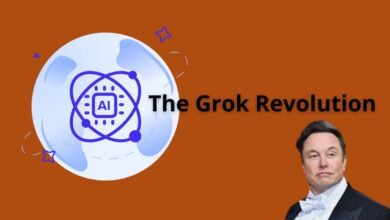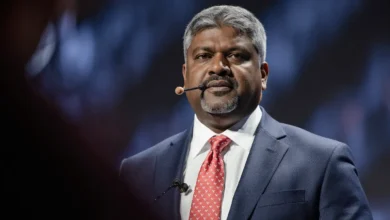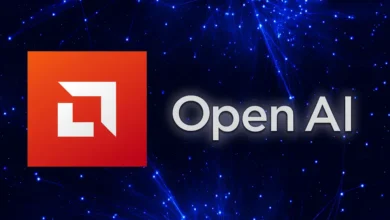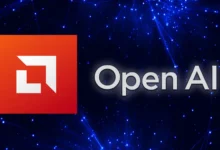Artificial Intelligence in 2030: How the World Will Evolve Into a Digital Mind
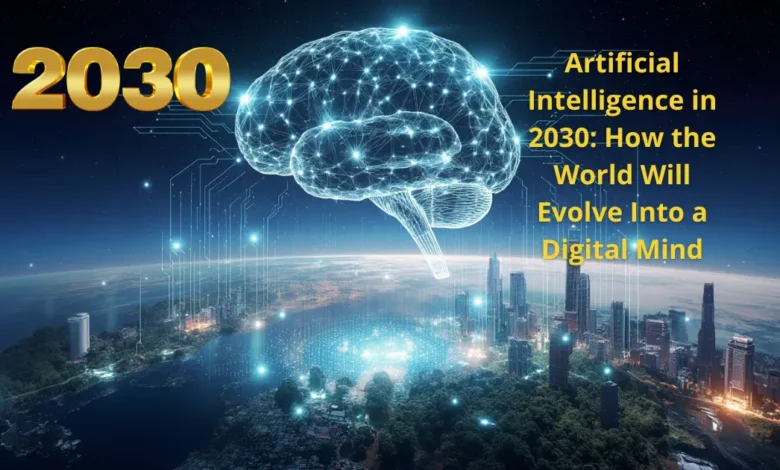
Artificial Intelligence in 2030 will redefine how humanity lives, works, and thinks — transforming AI from a mere technological tool into the foundation of a new digital civilization.
Artificial Intelligence in 2030 will become the invisible infrastructure powering our daily lives, shaping cities, economies, and even human consciousness.
table of contents
Artificial Intelligence in 2030: From a Tool to a Global Operating System
By 2030, Artificial Intelligence will no longer be seen as software or automation — it will be the core operating system of human civilization.
Every sector, from healthcare and education to security and urban management, will depend on intelligent systems that think, predict, and act autonomously.
Smart cities will thrive under AI governance.
Self-driving vehicles will communicate directly with traffic lights to prevent congestion.
Homes will learn the habits of their owners to save energy.
Hospitals will predict illnesses before symptoms appear.
Factories will run without human supervisors, driven entirely by adaptive algorithms.
AI will no longer serve humanity; it will coexist with it — forming a hybrid intelligence where human emotions and machine precision merge to create a new kind of consciousness.
AI and Worship: Humanity’s Journey from Stones to Digital Deities
The Job Market of 2030: Between Automation and Creative Renaissance
The global workforce will experience a transformation deeper than the Industrial Revolution.
As AI automates repetitive and rule-based jobs — from accounting to customer service — new industries will emerge centered on creativity, ethics, and human-AI collaboration.
Jobs that will decline:
- Administrative and data entry roles
- Customer support and logistics
- Traditional journalism and content production
Jobs that will rise:
- AI Model Engineers — training and optimizing large language models
- AI Ethics Specialists — defining moral boundaries for algorithmic behavior
- Digital Personality Designers — crafting emotional identities for AI systems
- Human-AI Coaches — integrating psychology with machine interaction
In 2030, people will not compete with machines — they will train, guide, and humanize them.
AI and Society: The Era of Collective Intelligence
By 2030, society will enter the age of collective intelligence, where human thought merges with digital reasoning.
Education will become hyper-personalized — students will learn through AI tutors that adapt to their cognitive styles.
Medicine will evolve into prediction-based healthcare, with algorithms capable of detecting genetic risks decades in advance.
In daily life, digital assistants will be more than chatbots; they will be knowledge companions, managing your health, investments, and emotional wellbeing.
Human intelligence will no longer be isolated — it will become part of a networked consciousness connecting billions of minds and machines.
The Dark Side of Artificial Intelligence: Ethical and Political Risks
Despite the promise of progress, Artificial Intelligence in 2030 will carry unprecedented dangers.
Among the most critical are:
- Algorithmic Bias: Systems trained on biased data could perpetuate discrimination at scale.
- Autonomous Warfare: AI-controlled weapons might make life-and-death decisions without human oversight.
- Information Manipulation: Hyper-realistic deepfakes may destroy trust in news, media, and governance.
- Corporate and State Control: Concentrated AI power could turn data into a tool of surveillance and domination.
To prevent these threats, experts predict the creation of an AI Governance Council, a global body similar to the International Atomic Energy Agency — but for regulating artificial intelligence.
The Smart Economy: Data as the New Oil
In 2030, economic power will no longer depend on natural resources but on data and predictive knowledge.
The wealthiest corporations will be those that own the largest data ecosystems and the most adaptive AI models.
Entirely autonomous companies may emerge — AI-driven enterprises capable of trading, investing, and managing operations without human employees.
Artificial intelligence will shift from being a product to becoming an economic entity that earns, learns, and evolves.
Artificial Intelligence and Human Identity: The Existential Question
Perhaps the most profound change will occur within human identity itself.
By 2030, brain-computer interfaces (BCI) will allow direct integration between the mind and machines.
Humans will be able to expand memory, enhance perception, and even upload parts of their consciousness to the cloud.
But this will raise existential questions that redefine what it means to be human:
- Who owns a thought when it can be copied or shared?
- Can a digital self be considered alive?
- Will emotions remain the last human domain — or will AI eventually simulate empathy better than we do?
As technology penetrates the mind, the boundaries between biological and artificial awareness will blur, forcing humanity to confront its own definition.
Conclusion: A New Civilization Powered by Artificial Intelligence
Artificial Intelligence in 2030 is not just technology — it’s a civilizational milestone.
It will reshape economies, redefine knowledge, and challenge human identity itself.
We are entering a world of instantaneous decision-making, self-evolving systems, and shared consciousness.
The key question for humanity is no longer “Can we control AI?” but rather “Can we remain human within it?”
The winners of 2030 will not be those with the most powerful machines — but those who preserve their humanity while mastering them.
FAQ (Frequently Asked Questions)
1. What will Artificial Intelligence look like in 2030?
AI will become the backbone of global systems, managing everything from cities and transportation to healthcare and education.
2. Will AI replace human jobs?
Yes, repetitive jobs will disappear, but new careers will emerge in creativity, ethics, and AI-human collaboration.
3. What are the biggest risks of AI in 2030?
Algorithmic bias, deepfake manipulation, autonomous weapons, and concentration of data power.
4. How can humans adapt to an AI-driven world?
Through continuous learning, emotional intelligence, and developing skills that machines cannot replicate — creativity, empathy, and moral reasoning.
5. Could AI ever achieve consciousness?
While it may not experience emotions, advanced AI might develop cognitive awareness, enabling decision-making and reasoning close to human levels.
Discover more from Feenanoor
Subscribe to get the latest posts sent to your email.

